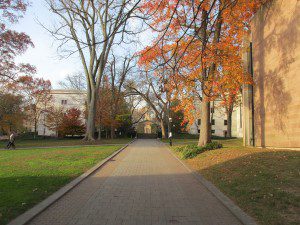 Megan McCardle of The Atlantic recently wrote a provocative piece suggesting numerous ways in which American higher education could adapt to fit a modern, technology-driven society. Her comments were no-holds-barred when it comes to the question of the “practicality” of a liberal arts degree. Here’s a bit of what she said:
Megan McCardle of The Atlantic recently wrote a provocative piece suggesting numerous ways in which American higher education could adapt to fit a modern, technology-driven society. Her comments were no-holds-barred when it comes to the question of the “practicality” of a liberal arts degree. Here’s a bit of what she said:
Online education will kill the liberal arts degree. Let’s not have the same dismal discussion of whether liberal arts degrees are awesome or useless. The important aspect for this discussion is that what they teach is hard to test efficiently. There’s enormous variation in grading of, say, English papers, and even if it were easier to standardize, that grading requires hours of expensive labor.
The president of my alma mater, Barry Mills, recently made his own contribution to this national discussion. I found his comments inspiring:
One day a few weeks ago, we asked fans of Bowdoin on Facebook to tell us “what makes Bowdoin Bowdoin?” The responses painted a picture of an institution of learning that is unique and prized by our students, alumni, parents, and friends. As I have often written, we could quickly reduce the cost of a Bowdoin education. It would mean larger class sizes, fewer faculty, fewer research opportunities, reduced athletic competition and dramatic changes to our coaching staffs, fewer clubs and fewer extracurricular experiences for our students. Simply, we would not be the Bowdoin that our students enjoy, our alumni love, and the world admires.
We should avoid the trap to conflate a Bowdoin education with education as a commodity. As a group of Bowdoin leaders and supporters today, we are the stewards of a remarkable institution that has long educated students in the liberal arts tradition and with a commitment to the common good. It is our responsibility to provide that opportunity well into the future for young men and women who have earned the right—through their hard work, ability, promise, and character—to join the ranks of the Polar Bears. We have a continuing responsibility to educate “leaders in all walks of life” and to stand strong in support of what we do here, even in the face of a growing conventional wisdom that attacks the college experience and questions the value of our form of education.
I see both sides to this challenging discussion. McCardle is surely right that changes will come and will alter the face of American higher education. The cost of education at some schools has, in the minds of many students, outpaced the benefits these schools offer. If the product is not top-notch, and if students perceive that, say, $35,000 a year just isn’t worth it when a $12,000 state or community college yields a similar outcome, then many colleges and universities in the next decade stand to suffer. This reality will draw many schools to reconsider their “business model” in some of the ways McCardle outlines–Internet courses and so on.
I am personally proud to see the president of Bowdoin take a stand for the humanities (the program of thought that provided the educational backbone of the Reformation, as seen in folks like Calvin and Zwingli). There are more important measures than the mean earnings of a school’s graduates. Around 27% of recent Bowdoin graduates went into teaching, for example. This profession is not lucrative–actually, scratch that. It is lucrative in terms of personal fulfillment, even if it is not in terms of salary (at least for many of us).
The humanities matter. Pure education, conducted for purposes of intellectual and moral development, matters. We may have to reckon with the hard economic realities of the college, university, and seminary worlds. But we must not sacrifice our belief that learning is to be valued on its own terms. In a Christian sense, in fact, there is nothing more foundational than to learn, to be taught, to be instructed and led into the way of knowledge that not only enlightens our minds but secures us in God’s steadfast grip (Proverbs 1:1-7).















